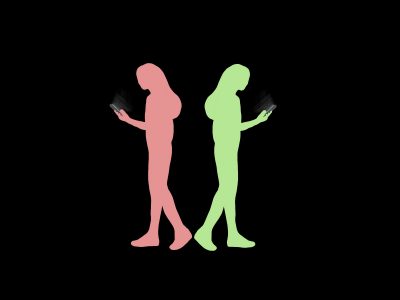The Generation Z experience is characterized by the onset of social media. What was once private is not anymore. We project a carefully crafted image of our prime moments on Instagram, Snapchat, Facebook and even LinkedIn.
These platforms represent a world we can escape to when we are overwhelmed with reality. But ultimately, we end up comparing ourselves to others’ carefully crafted images: Who is going to the best parties? Who is having the best vacation? Who got accepted to the best universities? Who has the best friends?

Social media functions as a highlight reel, which is not necessarily a bad thing. Sharing and receiving support for these moments feels amazing. Witnessing others’ best moments can also be empowering, and that happiness can be infectious.
It becomes a problem when we start to tell ourselves these moments are reflective of others’ entire realities. We know our own posts don’t tell the whole story, but for some reason, we don’t apply the same logic to others. Using limited and filtered information, we make judgements about the relative appearance, popularity, success and happiness of those we follow.
This paradoxical disconnection caused by hyperconnectivity doesn’t just occur with others — it can also happen with ourselves.
“A dangerous gap could grow between this idealized ‘front stage’ you and the real backstage ‘you,’ leading to a feeling of disconnection and isolation,” according to clinical psychologist Larry Rosen in Susan Greenfield’s book “Mind Change: How Digital Technologies Are Leaving Their Mark on Our Brains.”
We have attempted to bridge this gap with “finsta” accounts — a portmanteau of “fake” and “Instagram” — private Snapchat stories and the normalization of social media breaks. But these efforts, despite offering a temporary relief, have done little to actually address this problem.
TikTok, on the other hand, has changed the game.
TikTok has created a culture of vulnerability on social media, which is the foundation for self-confidence and empathy. On your “For You” page, there’s fewer flashy parties, exotic destinations and acceptance letters and more relatable content — how many times have you thought, “Wow, my FYP really said ‘for you’”?

Through short, simple videos, people unapologetically share their quirks, struggles, reflections and worldviews. This culture has been particularly helpful in validating experiences and struggles in a time of incredible unrest and confusion this past year. It truly created a sense of reassurance: We are all in this together.
Even TikTok posts about accomplishments tend to have different connotations. They seem more centered around offering inspiration and guidance. From fitness enthusiasts to young professionals, creators’ tones are less of “I did X!” and more of “This is how you can do X too.”
The ironic part is this vulnerability is usually built with people you have probably never met before. On TikTok, you post content that you would feel self-conscious about sharing with your friends on traditional social media platforms.
This unique structure dissolves inhibitions, allowing people to be more comfortable with themselves and others. The app’s algorithm makes popularity less dependent on who you know and more on how your content resonates with others.
“The bar is low. The stakes are low. Large audiences feel within reach, and smaller ones are easy to find, even if you’re just messing around,” according to a New York Times article by John Herrman on “How TikTok is Rewriting the World.”
It’s important to note TikTok is not immune to the shortcomings of social media. Content creators still seek validation through likes, follows and shares. Naturally, people still present themselves in a filtered way — literally and metaphorically — albeit to a lesser extent.
This trend of authenticity has extended to other aspects of social media. There are more Instagram posts encouraging self-care than ever, and when social media activism started becoming more popular, people were quick to call out perceived performative activism.
TikTok, thank you for rupturing the picturesque landscape of social media. Thank you for fostering connection when we needed it most.























































































































